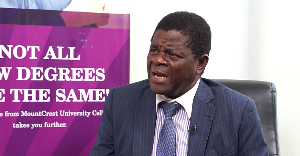Background
At 11:17 AM on September 15, 2015, the then-flagbearer of the ruling New Patriotic Party tweeted ‘’We in the NPP have the men and the women that will give Ghanaians a decent standard of living’’. This political statement implies that the NPP has the right people with the necessary skills, expertise, and leadership qualities to deliver policies and programs that will improve the standard of living of Ghanaians.
By stating that they have the "men and women" to achieve this goal, Nana wanted to convey the message that their party is better equipped to address the challenges facing Ghana and improve the standard of living for its citizens than their political opponents. By this statement, many Ghanaians reposed confidence in the abilities and qualities of the NPP's leaders and members by electing them in the 2016 general elections and they were re-elected in the 2020 elections. It is important to note that political statements like this are often made during election campaigns and may be influenced by political considerations.
While the NPP may genuinely believe that they have the best people to improve Ghana's standard of living, the actual impact of their policies and programs will depend on a variety of factors, including tackling corruption, economic conditions, social factors, and other contextual factors.
Economic hardships and pervasive corruption: where are the men and women?
Ghana has experienced a number of economic hardships in recent years, many of which have had a significant impact on the country's development and the welfare of its citizens. These challenges have been driven by a combination of domestic and external factors, ranging from declining commodity prices to rising debt levels and political uncertainty. While the NPP government has attributed these economic hardships to exogenous shocks such as a decline in commodity prices, particularly oil prices, endemic corruption has played a significant role.
Corruption undermines public trust in government institutions, increases the cost of doing business, distorts the allocation of resources, undermines the country's financial and regulatory institutions, and reduces the country's ability to mobilize domestic resources.
Corruption has long been identified as a major challenge to economic development in Ghana. The country has witnessed a number of high-profile corruption cases involving government officials and private individuals. One of the most notable cases was the KelniGVG scandal, which involved allegations of corruption and conflict of interest in the award of a contract to KelniGVG, a company tasked with monitoring revenue generated by telecom companies in Ghana. The scandal led to public protests and calls for an investigation into the contract award process. In addition, there have been several cases involving corruption in the procurement of government contracts, including the construction of a new terminal at the Kotoka International Airport and the supply of Sputnik V vaccines for COVID-19.
These cases have raised concerns about transparency and accountability in the government's procurement processes.
Despite these, the problem persists and continues to contribute to economic hardships in the country, leaving many questions to remain. Firstly, corruption undermines public trust and confidence in government institutions, leading to reduced investment, economic growth, and development. When people perceive that public officials are using their positions for personal gain, it can erode their trust in government institutions and the rule of law. This lack of trust can discourage investment, which can lead to reduced economic growth and development.
Secondly, corruption increases the cost of doing business in Ghana. Bribery and other forms of corruption can raise the cost of obtaining permits, licenses, and other essential approvals required to start and operate a business. This can lead to lower levels of investment, reduced competition, and increased prices for consumers.
Thirdly, corruption has distorted the allocation of resources, leading to inefficient and ineffective public spending. When resources are allocated based on political connections and personal gain rather than public interest, it can lead to poor quality and overpriced infrastructure projects, such as roads, schools, hospitals, and other public facilities. This has further strained the economy and reduced the quality of life for Ghanaians.
Furthermore, corruption has undermined the country's financial and regulatory institutions, which are crucial for ensuring macroeconomic stability and promoting economic growth. When regulators are not independent and are susceptible to corruption, it can lead to lax enforcement of regulations and standards, which can undermine the competitiveness of the economy.
Moreover, corruption has undermined the country's efforts to mobilize domestic resources and promote sustainable economic growth. The excessive corruption in public service has reduced the revenue available for investment in critical social and economic infrastructure. This has reduced the ability of the government to provide basic services to its citizens and can increase poverty levels.
What the "men and women" can do to tackle corruption
Corruption has long been a major challenge in Ghana, particularly within public institutions. Tackling corruption requires a comprehensive and sustained approach that targets both the supply and demand sides of corruption. The first step in tackling corruption is to strengthen the legal and regulatory framework. Ghana must ensure that its laws and regulations provide for effective deterrence and punishment of corruption.
This can include establishing anti-corruption agencies and strengthening existing ones, such as the Commission on Human Rights and Administrative Justice (CHRAJ) and the Economic and Organized Crime Office (EOCO). The laws must also provide for effective prosecution of corruption cases, including imposing severe penalties for those convicted. For example, in China, corruption has been a significant challenge for many years.
In recent times, the Chinese government has taken a tough stance on corruption, including the introduction of the death penalty for corruption in certain circumstances.
The Government of Ghana should promote transparency and accountability in public institutions. This can be achieved through measures such as public disclosure of government transactions, budget processes, and procurement activities. Ghana must also ensure that its public officials are subject to regular financial disclosure and that these disclosures are made available to the public. This can help to identify potential conflicts of interest and prevent abuse of public office for private gain.
Moreover, it is important to promote ethical leadership and integrity in public institutions. Ghana must prioritize ethical leadership and integrity as key components of public service. This can include promoting a culture of transparency, honesty, and accountability among public officials. Additionally, public officials must be held to a high standard of conduct, and those found to engage in corrupt practices must face swift and severe consequences.
Further, Ghana must promote public participation and citizen engagement in the fight against corruption. Ghana must encourage active citizen engagement in the monitoring and reporting of corruption. This can include the establishment of hotlines and other mechanisms for reporting corruption, as well as creating opportunities for citizen participation in decision-making processes and public service delivery.
Conclusively, tackling corruption in public office requires a comprehensive and sustained approach that targets both the supply and demand sides of corruption. Ghana must strengthen its legal and regulatory framework, promote transparency and accountability, promote ethical leadership and integrity, encourage public participation and citizen engagement, and promote international cooperation and collaboration. By taking these steps, Ghana can make significant progress in the fight against corruption, and pave the way for sustainable economic development and social progress.
Opinions of Wednesday, 12 April 2023
Columnist: Samuel Adomako, PhD



















